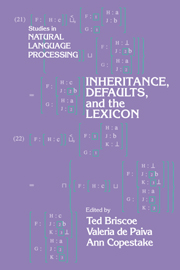Book contents
- Frontmatter
- Contents
- Contributors
- 1 Introduction
- 2 Skeptical and Credulous Default Unification with Applications to Templates and Inheritance
- 3 Prioritised Multiple Inheritance in DATR
- 4 Some Reflections on the Conversion of the TIC Lexicon into DATR
- 5 Norms or Inference Tickets? A Frontal Collision between Intuitions
- 6 Issues in the Design of a Language for Representing Linguistic Information Based on Inheritance and Feature Structures
- 7 Feature-Based Inheritance Networks for Computational Lexicons
- 8 A Practical Approach to Multiple Default Inheritance for Unification-Based Lexicons
- 9 The ACQUILEX LKB: An Introduction
- 10 Types and Constraints in the LKB
- 11 LKB Encoding of Lexical Knowledge
- 12 Defaults in Lexical Representation
- 13 Untangling Definition Structure into Knowledge Representation
- Appendix A A Bibliography of ACQUILEX Papers Connected with the LKB
- Appendix B The LKB Description Language Syntax
- Appendix C Software Availability
- References
- Author index
- Subject Index
2 - Skeptical and Credulous Default Unification with Applications to Templates and Inheritance
Published online by Cambridge University Press: 01 April 2010
- Frontmatter
- Contents
- Contributors
- 1 Introduction
- 2 Skeptical and Credulous Default Unification with Applications to Templates and Inheritance
- 3 Prioritised Multiple Inheritance in DATR
- 4 Some Reflections on the Conversion of the TIC Lexicon into DATR
- 5 Norms or Inference Tickets? A Frontal Collision between Intuitions
- 6 Issues in the Design of a Language for Representing Linguistic Information Based on Inheritance and Feature Structures
- 7 Feature-Based Inheritance Networks for Computational Lexicons
- 8 A Practical Approach to Multiple Default Inheritance for Unification-Based Lexicons
- 9 The ACQUILEX LKB: An Introduction
- 10 Types and Constraints in the LKB
- 11 LKB Encoding of Lexical Knowledge
- 12 Defaults in Lexical Representation
- 13 Untangling Definition Structure into Knowledge Representation
- Appendix A A Bibliography of ACQUILEX Papers Connected with the LKB
- Appendix B The LKB Description Language Syntax
- Appendix C Software Availability
- References
- Author index
- Subject Index
Summary
Abstract
We present a definition of skeptical and credulous variants of default unification, the purpose of which is to add default information from one feature structure to the strict information given in another. Under the credulous definition, the default feature structure contributes as much information to the result as is consistent with the information in the strict feature structure. Credulous default unification turns out to be non-deterministic due to the fact that there may be distinct maximal subsets of the default information which may be consistently combined with the strict information. Skeptical default unification is obtained by restricting the default information to that which is contained in every credulous result. Both definitions are fully abstract in that they depend only on the information ordering of feature structures being combined and not on their internal structure, thus allowing them to be applied to just about any notion of feature structure and information ordering. We then consider the utility of default unification for constructing templates with default information and for defining how information is inherited in an inheritance-based grammar. In particular, we see how templates in the style of PATR-II can be defined, but conclude that such mechanisms are overly sensitive to order of presentation. Unfortunately, we only obtain limited success in applying default unification to simple systems of default inheritance. We follow the Common Lisp Object System-based approach of Russell et al.
- Type
- Chapter
- Information
- Inheritance, Defaults and the Lexicon , pp. 13 - 37Publisher: Cambridge University PressPrint publication year: 1994
- 4
- Cited by



